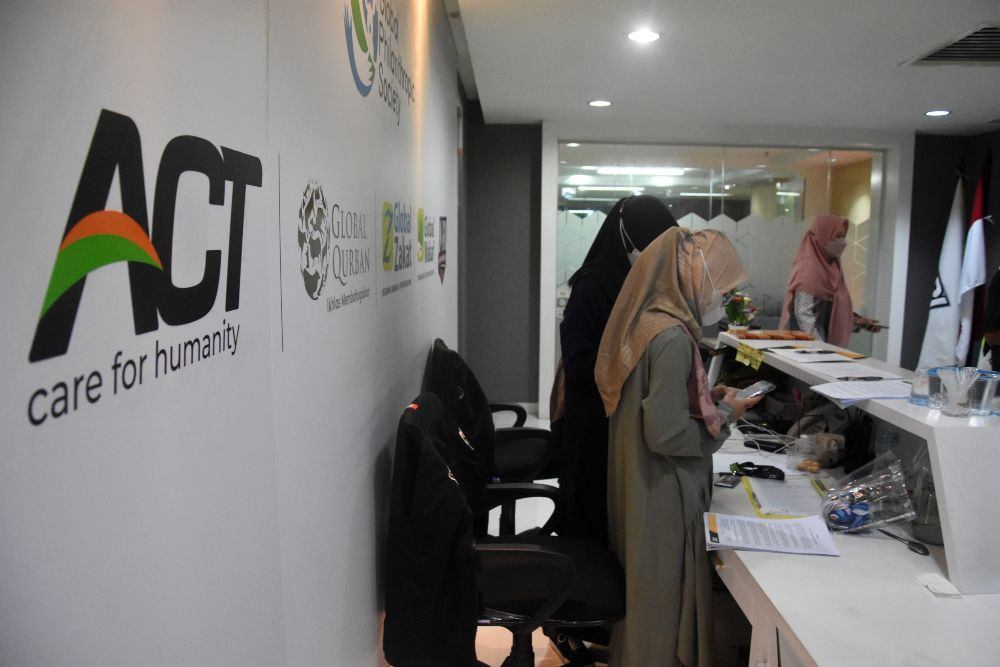Popular Reads
Top Results
Can't find what you're looking for?
View all search resultsPopular Reads
Top Results
Can't find what you're looking for?
View all search resultsPoor act of philanthropy
Whatever the merit of these serious accusations, since ACT has denied any impropriety, there is still the big problem of poor government supervision of the activities of charity organizations.
Change text size
Gift Premium Articles
to Anyone
 Under investigation: Aksi Cepat Tanggap (ACT) philanthropy organization employees work at their office in Menara 165 Tower in Jakarta on July 6. The Social Affairs Ministry has suspended ACT’s operating license pending an investigation into the alleged misappropriation of public funds the group has raised. (Antara/Indrianto Eko Suwarso)
Under investigation: Aksi Cepat Tanggap (ACT) philanthropy organization employees work at their office in Menara 165 Tower in Jakarta on July 6. The Social Affairs Ministry has suspended ACT’s operating license pending an investigation into the alleged misappropriation of public funds the group has raised. (Antara/Indrianto Eko Suwarso)
A
llegations of the gross mismanagement of massive funds at Aksi Cepat Tanggap (ACT) are giving a bad name to Indonesia’s nascent modern philanthropy business. As in modern banking, trust is the chief currency in philanthropy, and this is now going out of the window as few people would want to donate unless there are strong guarantees that the money would be spent on good causes.
ACT is one of the most successful philanthropic organizations in the country when it comes to raising funds, which in 2020 amounted to Rp 519 billion (U$6.7 million). Most of this money came in the form of religious alms from Muslim individuals, although ACT also received corporate donations. One that is now a source of contention is the money it received from Boeing intended for the families of the Lion Air jet crash that killed 189 people on board in 2018.
There are now questions about where the money went following an investigative report by Tempo magazine this month. The report said that ACT on average took a 13.5 percent cut on the money it collected, more than the 10 percent allowed by the Social Affairs Ministry, which oversees these organizations. Tempo also said ACT founders and leaders were paying themselves handsomely, plus benefits that befit executives of big corporations but not non-profit organizations.
The Financial Transaction Reports and Analysis Center (PPATK) says it is investigating suspicious transactions made by ACT, including one fund transfer to an Indonesian citizen who was recently arrested in Turkey on claims that he was part of the al-Qaeda terrorist network. The PPATK is also looking at money from ACT channeled to foreign organizations that may be linked to international terrorist networks and business entities owned by ACT founders and executives. The PPATK has brought in the National Counterterrorism Agency (BNPT) to help with its investigation.
Police are now investigating all these claims, and the Social Affairs Ministry has suspended ACT’s operating license, pending the results of the police investigation.
Whatever the merit of these serious accusations, since ACT has denied any impropriety, there is still the big problem of poor government supervision of the activities of charity organizations that raise large sums of money from the public. ACT may claim that its finances have been audited by public accounting companies, but this is insufficient.
These charity organizations operate based on an outdated 1961 law governing the gathering of money and materials from the public. The law does not provide enough requirements for greater transparency, accountability and government oversight. The law may have been good enough for simple and small-scale operations collecting religious alms in the past, but it is inadequate for modern philanthropy businesses involving large funds like ACT.
Indonesia has consistently scored high in the annual World Giving Index by Charity Aid Foundation, topping the list of the world’s most generous nations in 2021. But the country lacks the modern institutions, including in law enforcement, that govern the operation of modern philanthropic organizations.
Given the people’s high propensity to give charitably, such a law would create more vibrant but accountable and hence more trustworthy philanthropic activities in the country.










